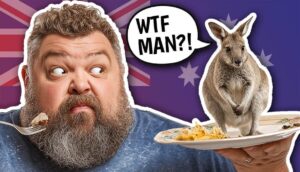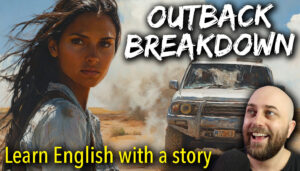
AE 941 - EXPRESSION:
Make Your Skin Crawl
Learn Australian English in this expression episode of the Aussie English Podcast.
These episodes aim to teach you common English expressions as well as give you a fair dinkum true-blue dose of Aussie culture, history, and news and current affairs

In today's episode...
I teach you how to use the expression “make your skin crawl”, the origin of the expression, and what is funny about a bumblebee.
We also talk about Angelina Jolie getting covered with bees for National Geographic. Lastly, I tell you what is a “myriapod”.
Improve your listening skills today – listen, play, & pause this episode – and start speaking like a native English speaker!
Get more out of every episode!

Premium Podcast members get access to...
- All 900+ podcast episodes including member-only episodes
- Member-only episode video lessons
- Downloadable transcript PDFs & audio files for every episode

Recent Episodes:


AE 1373 – 25 Things That Only Happen in Australia | Australian Culture Shock

AE 1372 – 18 Weird Things That Shock Tourists in Japan | Japanese Culture Shock

AE 1371 – The Goss: How Dad Self-Published a Book in Australia

AE 1370 – Learn English with a Short Story: Outback Breakdown

AE 1369 – Interview: A Silly Conversation With My Son Noah Smissen
AE 1368 – The Goss: What Are Some Australian Norms?

AE 1367 – Top 10 Aussie Movies

AE 1366 – The Goss: Aussie Farmer is Breeding Super Sheep

Share

Join my 5-Day FREE English Course!
Complete this 5-day course and learn how to study effectively with podcasts in order to level up your English quickly whilst having fun!


Want to improve a specific area of your English quickly and enjoyably?
Check out my series of Aussie English Courses.
English pronunciation, use of phrasal verbs, spoken English, and listening skills!

Have you got the Aussie English app?
Listen to all your favourite episodes of the Aussie English Podcast on the official AE app.
Download it for FREE below!



Want to improve a specific area of your English quickly and enjoyably?
Check out my series of Aussie English Courses.
English pronunciation, use of phrasal verbs, spoken English, and listening skills!
Leave a comment below & practice your English!






Responses